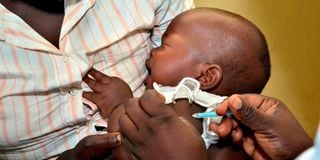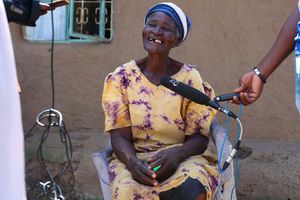Health ministers in renewed push to eradicate malaria

A baby receives her second dose of malaria vaccine at Ndhiwa Sub-County Hospital in Homa Bay County on April 16, 2021.
What you need to know:
- The African countries, plus India – are collectively responsible for over 70 per cent of the global malaria incidence and 73 per cent of global malaria mortality.
- In 2022, approximately 166 million malaria cases and 423,000 malaria deaths occurred in these 12 countries, according to WHO.
Sylvie is a 29-year-old mother of one who works as a seamstress at Mendong market in Yaounde Six, a municipality in the capital city of Cameroon.
On March 7, she received a call from her child's school informing her that the four-year-old boy had fallen ill.
She immediately abandoned the gown she was sewing for a client and the uniform she was to wear for International Women’s Day 2024 celebrations.
“I rushed to school and found my son with fever — a body temperature of almost 39°C. I took him to a private clinic and doctors said he had malaria,” Sylvie, who requested that we use only her forename, explained. The child was put on a three-day treatment.
Malaria is the most widespread endemic disease in Cameroon, with nearly six million cases reportedly annually and about 4,000 deaths, most of which occur in children below the age of five, according to the World Health Organization (WHO).
Paradoxically, Sylvie’s son was diagnosed with malaria just miles away from the Yaounde Conference Center, where African ministers of health and senior government officials met 24 hours earlier and pledged ‘unwavering commitment’ to reduce mortality of the disease that kills 580,000 people on the continent annually.
The historic Yaounde gathering that culminated in the signing of the ‘Yaounde Declaration’ brought together ministers of Health, global malaria partners, funding agencies, scientists, civil society organisations and other principal malaria stakeholders. Africa continues to shoulder the heaviest malaria burden, representing 94 per cent of global malaria cases and 95 per cent of global malaria-related deaths. The continent recorded an estimated 580,000 deaths in 2022.
Some 11 countries on the continent; Burkina Faso, Cameroon, Democratic Republic of Congo, Ghana, Mali, Mozambique, Niger, Nigeria, Sudan, Tanzania and Uganda — whose Health ministers took part in the ministerial conference and inked the ‘Yaounde Declaration’ — bear the heaviest burden of the disease.
The African countries, plus India – are collectively responsible for over 70 per cent of the global malaria incidence and 73 per cent of global malaria mortality. In 2022, approximately 166 million malaria cases and 423,000 malaria deaths occurred in these 12 countries, according to WHO.
While efforts have been made to reduce global malaria burden, WHO says progress has stalled in the Africa region since 2017 and the ministers from the 11 hardest-hit countries on the continent are now determined to ensure no one dies again from the killer disease.
In their declaration, the ministers expressed their “unwavering commitment to the accelerated reduction of malaria mortality” and “to hold each other and our countries accountable for the commitments outlined in this declaration”.
In a similar meeting in Abuja, Nigeria in 2001, leaders committed to fighting the disease by allocating 15 per cent of their government budgets to health. However, no new commitments or clear targets and deadlines were highlighted in the ‘Yaounde Declaration’.
In Yaounde, the ministers committed to increasing funding and bolstering investment in critical infrastructure, expanding personnel technological capacities and ensuring the implementation of effective programmes. They further pledged to enhance multi-sectoral collaboration and to build strategic partnerships for funding, research and innovation. “This declaration reflects our shared commitment as nations and partners to protect our people from the devastating consequences of malaria,” said Dr Manaouda Malachie, Cameroon Minister of Public Health. “We will work together to ensure that this commitment is translated into action and impact.”
Dr Jerome Salomon, the assistant director-general of Universal Health Coverage/Communicable and Non-communicable Diseases at WHO, hailed the declaration, describing it as “a milestone moment in the global response to malaria”.
The agreement on key actions to accelerate progress towards achieving global targets to end malaria with the endorsement of the ‘Yaounde Declaration’ comes at a time when some countries have started vaccination against the killer disease. Cameroon rolled out RTS,S vaccine in late January, becoming the first country to officially administer the WHO-approved jab on the continentoutside the malaria vaccine pilot programme that was carried out in Ghana, Kenya and Malawi.
The four-year pilot programme vaccinated more than two million children.
Yet hesitancy has prevented some children from being jabbed. Cameroon suffers a spooky vaccine hesitancy problem, with even schooled persons surprisingly fronting anti-vaccine campaigns.
Sylvie said despite the free malaria vaccine in Cameroon, she has not vaccinated her son “due to personal reasons”.
With such hesitancy, malaria continues to cause preventable deaths in children and great devastation to families across the African region, according to Dr Matshidiso Moeti, WHO Regional Director for Africa, who said she welcomed the Yaounde ministerial declaration, “which demonstrates a strong political will to reduce the burden of the deadly disease.”
“With renewed urgency and commitment, we can accelerate progress towards a future free of malaria,” said Dr Moeti.
However, changing the malaria story will not happen in a single meeting or a single day. Experts say pledges like those made in Yaounde must be met with concrete financial commitments for it to be translated into action. “Commitments made today will need to be translated into concrete actions and financial resources in order achieve our shared vision,” Dr Jerome Salomon from WHO said.
The African Union (AU) targets the elimination of malaria on the continent by 2030, but despite political will, countries lack the resources necessary to fully implement their national malaria strategic plans, sustain essential life-saving malaria services and deploy new and more effective interventions to address increasing biological threats. In its 2023 Africa Malaria Progress Report, the AU says member states are particularly impacted by the global financial crisis and will be unable to sustain existing levels of essential malaria interventions—especially in 2026.






